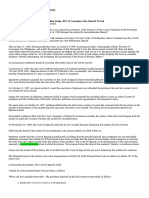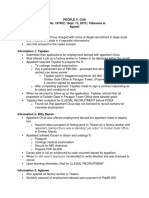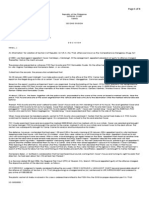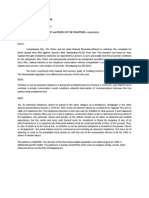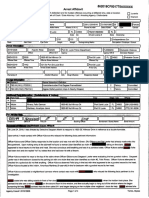Material Distributor Inc V Natividad
Material Distributor Inc V Natividad
Uploaded by
Ruab PlosCopyright:
Available Formats
Material Distributor Inc V Natividad
Material Distributor Inc V Natividad
Uploaded by
Ruab PlosOriginal Description:
Original Title
Copyright
Available Formats
Share this document
Did you find this document useful?
Is this content inappropriate?
Copyright:
Available Formats
Material Distributor Inc V Natividad
Material Distributor Inc V Natividad
Uploaded by
Ruab PlosCopyright:
Available Formats
G.R. No.
L-1716
June 28, 1949
MATERIAL DISTRIBUTORS (PHIL.), INC., and HARRY LYONS, petitioner, vs. FELIPE NATIVIDAD, Judge of First Instance of Manila, and LOPE SARREAL, respondents. Gibbs, Gibbs, Chuidian and Quasha for petitioner. Claro M. Recto for respondent Lope Sarreal. No appearance for respondent Judge. PERFECTO, J.: On March 24, 1947, Lope Sarreal filed a complaint (amended on April 10, 1947, to include Harry Lyons) seeking a money judgment against petitioners on three causes of action in the total of P1,256,229.30. On May 27, 1947, Sarreal filed a motion for the production and inspection of the following documents: I. Books or Papers of Material Distributors (Phil.) Inc.: 1. Cash Receipts Journal 2. Cash Payments Journal 3. All Individual Ledgers, specially of the following persons or entities (a) British-American Engineering Corporation (b) Philippine Refinery (c) Felipe Buencamino (d) Luzon Stevedoring (e) Standard Oil Company of New York (f) Philippine Exchange Co., Inc. (g) Manila Laundry Company (h) Filipino Businessmen's Syndicate (i) Material Distributors Inc., Wichita, Kansas (j) Harry Lyons 4. All letters exchanged between Material Distributors (Phil.) Inc., Material Distributors, Inc. of Wichita, Kansas and Harry Lyons, between October 9, 1946 and March 31, 1947. 5. All cablegrams exchanged between Material Distributors (Phil.), Inc., and Material Distributors, Inc., Wichita, Kansas, between October 9, 1946 to March 31, 1947. II. Books and Papers of the defendant Harry Lyons. 1. Letters exchanged between Harry Lyons and Material Distributors, Inc., Wichita, Kansas between September 14, 1946 and March 24, 1947. 2. Cablegrams exchanged between Harry Lyons and Material Distributors, Inc., Wichita, Kansas, between September 14, 1946 and March 24, 1947. 3. Cash Receipts Journal. 4. Cash Payments Journal. On June 4, 1947, Sarreal filed a supplemental motion for the production and inspection of the originals of Annexes A and B of the complaint. On June 12, 1947, petitioner filed a memorandum and opposition to Sarreal's above mentioned original and supplemental motion on the ground that he failed to show good cause and that the motion were evidently filed for the purpose of fishing evidence. On July 16, 1947, respondent judge, granting both motions, required petitioners to produce the documents and annexes in question on July 24, 1947. On account of the absence in the Philippines of Harry Lyons, petitioner moved, reserving whatever rights they have under the Rules of Court, to postpone the inspection of the documents and annexes in question and accordingly respondent judge postponed it to August 15, 1947. On August 13, 1947, petitioners moved for the reconsideration of the order of July 16, on the following grounds: "(a) Article 46 of the Code of Commerce which prohibits the delivery, communication and general examination of the correspondence of merchants, a substantial right, as well as the petitioners' right to the
inviolability of their correspondence as guaranteed by the Constitution would be violated by the order requiring the production of the following documents: BOOKS AND PAPERS OF DEFENDANT HARRY LYONS (1) Letters exchange between Harry Lyons and Material Distributors, Inc., of Wichita, Kansas, between Sept. 14, 1946 and March 24,1947; (2) Cablegrams exchanged between Harry Lyons and Material Distributors, Inc., of Wichita, Kansas, between September 14, 1946 and March 24, 1947. BOOKS AND PAPERS OF MATERIAL DISTRIBUTORS (PHIL.) INC. (4-5) All letters and cablegrams exchanged between Material Distributors (Phil.), Inc., Material Distributors, Inc., of Wichita, Kansas, and Harry Lyons between October 9, 1946 and March 31, 1947. "(b) That the production for the plaintiff's inspection of all the foregoing documents above enumerated, as well as of the following documents, would constitute a "fishing expedition," not allowed by Rule 21 of the Rules of Court, since their materiality or probable materiality is not shown by the pleadings of the parties except by movant's bare allegation which are disputed by your petitioners: BOOKS AND PAPERS OF MATERIAL DISTRIBUTORS (PHIL.) INC. 1-2. Cash Receipts Journal and Cash Payments Journal. 3. All individual Ledgers, specially of the following persons or entities. (b) Philippine Refinery. (c) Felipe Buencamino. (d) Luzon Stevedoring. (e) Standard Oil Company of New York. (f) Philippine Exchange Co., Inc. (g) Manila Laundry Company. "(c) That plaintiff is not entitled to the production and inspection of the originals of Annexes A and B because his only purpose, as stated in his supplemental motion, Exhibit D, was to find out if a case of falsification has been made; that the issue between the parties in this regard is material only to your petitioners' affirmative defense, and if the plaintiff's purpose was as stated in said supplemental motion, then your petitioners claimed their privilege against self-incrimination. That this letter privilege was also claimed insofar as the production and inspection of the other documents were concerned by your petitioners in view of counsel for respondent Lope Sarreal's charge to the Honorable City Fiscal for the City of Manila that your petitioners were violating our Corporation Law." On September 27, 1947, respondent judge denied the motion for reconsideration. Petitioners impugn the validity of the orders of July 16 and September 27, 1947, as were issued by the respondent judge in excess of his jurisdiction or with grave abuse of his discretion, and prayed for the annulment or modification of the order of July 16, 1947. Respondent Sarreal advanced the following reasons to show that the orders complained of were not issued in excess of the trial court's jurisdiction or with grave abuse of discretion: (a) The motions of the respondent Lope Sarreal of May 27, 1947 and June 4, 1947 contain allegations of the ultimate fact that the books and papers mentioned in said motions constitute or contain evidence material to the matters involved in the case and are in the possession, custody or control of the petitioners herein, and allegation to this effect is adequate showing of good cause for the production and inspection of the documents mentioned therein, being an allegation in the very words used in Form 11 of the Appendix Forms of our Rules of Court, and therefore a sufficient compliance with said Rule (Go Tianco vs. Judge Diaz, G. R. L-7, January 22, 1946, reported in the June 1946 issue of the official Gazette). (b) Article 46 of the Code of Commerce invoked by the petitioners does not apply to cases of production and inspection of books and papers belonging to a party to the action in which such production and inspection are sought(Decision of Supreme Court of Spain of March 30, 1894). At any rate, said Article of the Code of Commerce has been impliedly repealed by Act No. 190, pertinent portions of which are now embodied in our Rules of Court (3 Op. of Atty. Gen., 380). (c) Neither would the inspection of books and papers of the petitioners amount to a violation of the inviolability of the correspondence under Sec. 1, No. 5, Article III of the Constitution of the Philippines,
considering that the inspection of said books and papers are sought through proper order of the trial court, and the Constitutional provision invoked by the petitioners precisely allows inspection of communication and correspondence upon lawful order of the court. Moreover, this provision of our Constitution creates no new right, being merely a re-enforcement of the Constitutional prohibition against unreasonable searches and seizures (Sinco, Philippine Government and Political Law, 4th Edition, p. 632), and when the inspection of such books and papers was allowed "upon lawful order of the court" made through the respondent Judge, such inspection cannot be considered as unreasonable although such books and papers are private in character (First National Bank vs. Hughes, 6 Fed., C 737, 741, appeal dismissed for want of jurisdiction in 106 U.S., 523, 27 Law ed., 268, 1 Sup. Ct. Rep. 489; Johnson Steel Street-Rail Co. vs. North Branch Steel Co., 48 Fed., 191; Victor G. Beede Co. vs. Joseph Bancroft and Sons Co., 98 Fed., 175, affirmed in 52 L. R. A., 734, 45 C. C. A., 354, 106 Fed., 396, where this question was not involved; Burnham vs. Morrissey, 14 Gray, 226, 74 A. Dec., 676; United States vs. Terminal R. Assoc., 148 Fed., 486; Re Dunn, 9 Mo. App., 225; Elder and Bogardus, 1 Edm. Sel Cas., 110; Boston and M. R. Co. vs. States [N. H.], 77 Atl., 996; Hopkinsonvs. Burghley, L. R. 2ch., 447; Groker-Wheeler Co. vs. Bullock [C. C.], 134 Fed., 241; Re Bolster, 110 Pac., 547.). (d) The inspection of the said documents is not for the purpose of "fishing evidence" but with a view to enabling the respondent Lope Sarreal to designate with the particularity of the subpoena duces tecum to be obtained in connection with trial of the case on its merits the specific books and papers containing the entry of receipts and payments made by the petitioners, such books and papers being material to the case in view, among others, of the allegation in the amended complaint that the defendants, the petitioners herein, had been remitting all or the greater volume of the proceeds from the sales of equipment and materials of the defendants in Civil Case No. 2059 outside the jurisdiction of the trial court and had been disposing of their properties with the intention of defrauding their creditors. At any rate, "fishing expedition" is allowed and is precisely contemplated in Rule 21 of our Rules of Court as a weapon of discovery (XXVI Am. Bar. Ass. Jur. No. 1, Jan. 1940, 48; Golden vs. Arcadia Mutual Casualty Company, D. C. III., 1942, 3 F. R. D., 26; Leach vs. Griff Bros. Coop. Corp., D. C. Miss, 1942 2 F. R. D., 444; Civil Aeronautics Board of Aeronautics Authority vs. Canadian Colonial Airways, D. C., 1941, 41 F. S., 1006; Quemus Theatre Co. vs. Warner Bros. Pictures, D. C. N. J., 1940, 35 F. S., 949; United Mercantile Agency vs. Silver Fleet Motor Express, D. C. Ky., 1941, F. R. D., 709; Walling vs. Richmon Screw Anchor Company, D. C. N. Y., 1943,4 F. R. D., 265; Monarch Liquor Corp. vs. Schenley Distillers Corp., D. C. N.Y., 1941, 2 F. R. D., 51; Walsh vs. Comm. Mutual Life Insurance Company of Hartford, Conn. [1939], 26 F. Supp., 556; Olson Transportation Companyvs. Socony Vacuum Oil Company, 7 F. R. D., 234). (e) The originals of Annexes A and B are relevant not only to the case of the defendants but also to that of the plaintiff in Civil Case No. 2059 here involved, in view of the issue of fact raised by the pleadings of the parties as to whether the originals of Annexes A and B have been falsified by the insertion therein of the names of Gil J. Puyat and Raymond Lehmann after said Annexes were signed by respondent Lope Sarreal and delivered to the petitioner Harry Lysons, in view of which respondent Lope Sarreal is entitled to the production and inspection thereof under the provisions of Rule 21 of our Rules of Court. (f) Even if ocular inspection of said Annexes A and B may reveal falsification thereof by the petitioners amounting to a violation of the applicable provisions of our Revised Penal Code, the petitioners cannot exempt themselves from the production of said exhibits for mere inspection and copying, inasmuch as the Constitutional prohibition against self-incrimination has been extended in specific case only to the production of documents as evidence, and only when the person producing them is made to take the witness stand and identify them under oath, and not to the production of such documents for mere inspection (Comm. vs. Southern Express Co., 1914, 160 Ky., 1, 169 SW., 517, annotated cases 1916A, 373, L. R. A., 1915B, 913; U. S. vs. Hughes, 12 Blatchff, 553); the reason being that the Constitutional prohibition is one against compelling a person to be a "witness against himself", and this has been held to meantestimonial compulsion or extraction of admission form the person's own lips (4 Wigmore, 865, 2263; Wilsonvs. U. S., 55 Law, ed., 776, citing cases). (g) Moreover, the corporate records sought to be inspected are not covered by the Constitutional prohibition against self-incrimination, even though such documents may contain evidence tending to subject any or all of the officers of a corporation to a criminal indictment (Wilson vs. U. S., 221 U. S., 361, 51 Law. ed., 771; Oklahoma Press Pub. Co. vs. Walling, 327 U. S.,186, 90 Law. ed., 614, 627-629; U. S. vs. Baunch & Lamp Optical Co., 321U. S., 707, 88 Law. ed., 1024, 1037 [1944]; U. S. vs. White, 88 Law. ed., 1547). (h) Production and inspection of documents have been allowed and sustained in decided cases, under Orders which were broader than those here assailed, for the production and inspection of all books of accounts, all memoranda and records, stocks book, ledger, journal, cash book, bank book, bank deposit slip, check book, voucher, contract, income tax return, booking record and correspondence (U. S. vs. Duoder, 1 F. R. S., 466, U. S. D. C. June 16, 1939; Orange Country Theater Corp. vs. League, 1 F. R. S., 448). (i) The respondent Judge, before issuing the Orders complained of, gave the parties full opportunity, not only to discuss the question involved by repeated oral arguments but also by written memoranda, and in the exercise of his discretion issued the Orders complained of only after full consideration of all the questions of fact and law involved.
The production and inspection of documents and books here in question call for the interpretation and application of section 1 of Rule 21, which reads as follows: SECTION 1. Motion for production or inspection; order. Upon motion of any party showing good cause therefor and upon notice to all other parties, the court in which an action is pending may (a) order any party to produce and permit the inspection and copying or photographing, by or on behalf of the moving party, of any designated documents, papers, books, accounts, letters, photographs, objects or tangible things, not privileged, which constitute or contain evidence material to any matter involved in the action and which are in his possession, custody or control; or (b) order any party to permit entry upon designated land or other property in his possession or control for the purpose of inspecting, measuring, surveying, or photographing the property or any designated relevant object or operation thereon. The order shall specify the time, place and manner of making the inspection and taking copies and photographs, and may prescribe such terms and conditions as are just. Petitioners contend that in filling his original and supplemental motions, Sarreal has failed to show good cause for the issuance of the requested order. It appears, however, in the original motion of May 27, 1947, that the books and papers therein mentioned "constitute or contain the evidence material to the matters involved in the above entitled case." In the supplemental motion of June 4, 1947, it is alleged that there is direct conflict between the allegations of the complaint and amended complaint and those of the answer and amended answer as to whether or not the names of Gil J. Puyat and Raymond W. Lehmann appear in any part of the originals of Annexes A and B of the complaint, and plaintiff Sarreal wanted the production and inspection of said originals to show that they did not contain the names of Gil J. Puyat and Raymond W. Lehmann, and that if said names should appear now typed in said Annexes A and B, said additional names must have been typed by direction of Harry Lysons without the knowledge or consent of Sarreal and after said originals were delivered by Harry Lysons and filed by the latter and that the changes so introduced are a forgery. With these allegations in the original and supplemental motions Sarreal has fulfilled the requirements of showing good cause for the production and inspection of the books and documents in question under Rule 21. Petitioners contained that the order of the trial judge violated petitioner's constitutional rights against selfincrimination. We have considered carefully persons advanced by petitioners and memoranda in support of this allegation and we found nothing in them to show how, without the inspection of Annexes A and B of the complaint, petitioners may incriminate themselves. We have, therefore, to dismiss such contention. (3) The right of the people to be secure in their persons, houses, papers, and effects against unreasonable searches and seizure shall not be violated, and no warrant shall issue but upon probable cause, to be determined by the judge after examination under oath or affirmation of the complainant and the witnesses he may produce, and particularly describing the place to be searched, and the persons or things to be seized." (Sec. 1. Art. III, Constitution of the Philippines.) (5) The privacy of communication and correspondence shall be inviolable except upon lawful order of the court or when public safety and order require otherwise. (Sec. 1. Art. III, Constitution of the Philippines.) The orders in question, issued in virtue of the provisions of Rule 21, pertain to a civil procedure that cannot be identified or confused with the unreasonable searches prohibited by the Constitution. But in the erroneous hypothesis that the production and inspection of books and documents in question is tantamount to a search warrant, the procedure outlined by Rule 21 and followed by respondent judge place them outside the realm of the prohibited unreasonable searches. There is no question that, upon the pleadings in the case, Sarreal has an interest in the books and documents in question, that they are material and important to the issues between him and petitioners, that justice will be better served if all the facts pertinent to the controversy are placed before the trial court. The constitutional guarantee of privacy of communication and correspondence will not be violated, because the trial court has power and jurisdiction to issue the order for the production and inspection of the books and documents in question in virtue of the constitutional guarantee making an express exception in favor of the disclosure of communication and correspondence upon lawful order of a court of justice. After a careful consideration of the legal question raised by petitioners, this Court has arrived at the conclusion that the trial judge, in issuing the order of July 16, 1947, has not exceed his jurisdiction or acted with grave abuse of discretion. Petition denied with costs against petitioner. Moran, C.J., Paras, Feria, Tuason, Montemayor, and Reyes, JJ., concur. MORAN, C.J.: Mr. Justice Pablo voted for this decision.
You might also like
- Dr. Gobenciong v. CADocument24 pagesDr. Gobenciong v. CAPaolo OrtizNo ratings yet
- People Vs Buban DigestDocument2 pagesPeople Vs Buban DigestRuab PlosNo ratings yet
- People Vs Buban DigestDocument2 pagesPeople Vs Buban DigestRuab PlosNo ratings yet
- Independent Contractor Agreement CSPDocument3 pagesIndependent Contractor Agreement CSPSamantha Canteen100% (1)
- Individual Identification Information Record - OrEA 630 BlankDocument4 pagesIndividual Identification Information Record - OrEA 630 BlankDavid PylypNo ratings yet
- In Re Valenzuela and Vallarta DigestDocument2 pagesIn Re Valenzuela and Vallarta DigestTrina Donabelle Gojunco100% (9)
- Reyes Vs BarriosDocument9 pagesReyes Vs BarriosElaine Aquino MaglaqueNo ratings yet
- Republic V JabsonDocument2 pagesRepublic V JabsonJoyceNo ratings yet
- People V TarayaDocument5 pagesPeople V TarayaMark DungoNo ratings yet
- Re - Problem of Delays in Cases Before The SandiganbayanDocument24 pagesRe - Problem of Delays in Cases Before The SandiganbayanMildred MendozaNo ratings yet
- Danville v. COADocument2 pagesDanville v. COAAndi DimalantaNo ratings yet
- US Vs LulingDocument3 pagesUS Vs LulingKeisha Mariah Catabay LauiganNo ratings yet
- Handouts MichDocument2 pagesHandouts MichMich Padayao100% (1)
- Grandteq Industrial Steel Products Inc v. Margallo Case DigestDocument4 pagesGrandteq Industrial Steel Products Inc v. Margallo Case DigestJulia Camille RealNo ratings yet
- Chuayuco Steel and or Edwin Chua vs. Buklod NG Manggagawa Sa Chuayuco Steel, 533 SCRA 621 (2007)Document2 pagesChuayuco Steel and or Edwin Chua vs. Buklod NG Manggagawa Sa Chuayuco Steel, 533 SCRA 621 (2007)Lu CasNo ratings yet
- The Hercules Industries V SOLEDocument2 pagesThe Hercules Industries V SOLEArvin Robert100% (1)
- Allado vs. DioknoDocument8 pagesAllado vs. DioknoNoo NooooNo ratings yet
- 139 Lao Gi V CA (Pintor)Document1 page139 Lao Gi V CA (Pintor)Trisha Dela RosaNo ratings yet
- Fajardo v. Garcia G.R. No. L-38675Document5 pagesFajardo v. Garcia G.R. No. L-38675AliyahDazaSandersNo ratings yet
- People V LungayanDocument1 pagePeople V LungayanGSSNo ratings yet
- Salvador Yapyuco y Enriquez VDocument69 pagesSalvador Yapyuco y Enriquez VJonna Maye Loras CanindoNo ratings yet
- MARINA Vs COADocument1 pageMARINA Vs COAangelsu04No ratings yet
- Hearsay Rule: Existence of Exhibit D DISCUSSION: The Prosecuting Attorney Stated in Open Court That AntonioDocument2 pagesHearsay Rule: Existence of Exhibit D DISCUSSION: The Prosecuting Attorney Stated in Open Court That AntonioG FNo ratings yet
- COA v. HinampasDocument4 pagesCOA v. HinampasStradivariumNo ratings yet
- City of Manila Vs Del Rosario & People vs. CabuangDocument2 pagesCity of Manila Vs Del Rosario & People vs. CabuangReyes OdessaNo ratings yet
- 62 Court Administrator v. QuinanolaDocument1 page62 Court Administrator v. QuinanolaNMNGNo ratings yet
- COA Vs HinampasDocument2 pagesCOA Vs HinampasBryan-Charmaine ZamboNo ratings yet
- SEC v. Merchant Capital, LLC, 11th Cir. (2009)Document5 pagesSEC v. Merchant Capital, LLC, 11th Cir. (2009)Scribd Government DocsNo ratings yet
- YSIDORO v. DE CASTRODocument1 pageYSIDORO v. DE CASTROAfricaEdnaNo ratings yet
- Sukhothai Cuisine and Restaurant V CADocument1 pageSukhothai Cuisine and Restaurant V CAMariz GalangNo ratings yet
- Osmeña vs. Pendatum 109 Phil 863 PDFDocument26 pagesOsmeña vs. Pendatum 109 Phil 863 PDFMykaNo ratings yet
- 1 - Capitol Subdivision V Province of Negros OccidentalDocument6 pages1 - Capitol Subdivision V Province of Negros Occidentalsitsee watchNo ratings yet
- People Vs FallonesDocument13 pagesPeople Vs FallonesJhanelyn V. InopiaNo ratings yet
- PP v. YutilaDocument2 pagesPP v. Yutilacymon_argawanon6040No ratings yet
- Santiago JR Vs CSC DigestDocument1 pageSantiago JR Vs CSC DigestDianaVillafuerteNo ratings yet
- Del Castillo vs. TorrecampoDocument3 pagesDel Castillo vs. TorrecampoSherwin Anoba CabutijaNo ratings yet
- Peña & Erlana Vda. de Inocencio Vs CA G.R. No. 126275Document6 pagesPeña & Erlana Vda. de Inocencio Vs CA G.R. No. 126275Hanzel Uy VillonesNo ratings yet
- Reyes Fajardo Cspri Presentation NotesDocument18 pagesReyes Fajardo Cspri Presentation Notesceedheo17No ratings yet
- People V. Cua G.R. No. 187052 - Sept. 12, 2012 - Villarama Jr. Appeal FactsDocument5 pagesPeople V. Cua G.R. No. 187052 - Sept. 12, 2012 - Villarama Jr. Appeal FactsAliyah RojoNo ratings yet
- Transport vs. LaguesmaDocument8 pagesTransport vs. LaguesmaHipolitoNo ratings yet
- David Vs ArroyoDocument5 pagesDavid Vs ArroyoPortia WynonaNo ratings yet
- 01 PP v. MendozaDocument21 pages01 PP v. MendozaNinaNo ratings yet
- US vs. Ang Tang HoDocument13 pagesUS vs. Ang Tang HoMariko IwakiNo ratings yet
- Phil Trust V Luzon SuretyDocument2 pagesPhil Trust V Luzon SuretyJudy Rivera100% (1)
- (I4) Bureau of Telecomunications V PSC 29 SCRA 751Document2 pages(I4) Bureau of Telecomunications V PSC 29 SCRA 751MhaliNo ratings yet
- G.R. Nos. 138195-96 July 10, 2003 - PEOPLE OF THE PHIL. v. NICANOR ROA - July 2003 - Philipppine Supreme Court DecisionsDocument27 pagesG.R. Nos. 138195-96 July 10, 2003 - PEOPLE OF THE PHIL. v. NICANOR ROA - July 2003 - Philipppine Supreme Court DecisionsJoses Nino Aguilar0% (1)
- Naag To EmpelisDocument6 pagesNaag To EmpelisRihan NuraNo ratings yet
- 2018 Boston Finance and Investment Corporation v. Candelario v. Gonzalez PDFDocument13 pages2018 Boston Finance and Investment Corporation v. Candelario v. Gonzalez PDFChesca MayNo ratings yet
- CO V Deportation BoardDocument2 pagesCO V Deportation BoardCelinka ChunNo ratings yet
- In Re Adoption of Stephanie GarciaDocument3 pagesIn Re Adoption of Stephanie GarciaIbid AngelesNo ratings yet
- University of The Philippines College of Law: People V Cusi, JRDocument2 pagesUniversity of The Philippines College of Law: People V Cusi, JRcelestialfishNo ratings yet
- 250 Pentagon Steel V, CADocument2 pages250 Pentagon Steel V, CANinaNo ratings yet
- G.R. NO. 151932, August 19, 2009Document1 pageG.R. NO. 151932, August 19, 2009MACNo ratings yet
- E. Tongco v. VianzonDocument2 pagesE. Tongco v. VianzonjohnmiggyNo ratings yet
- IrrDocument6 pagesIrrGilbertNo ratings yet
- Cases On Evidence - DigestDocument2 pagesCases On Evidence - DigestRey Franz CabidogNo ratings yet
- PRUDENTIAL BANK VDocument1 pagePRUDENTIAL BANK VKornessa ParasNo ratings yet
- CONSTI 1 DOCTRINES MIDTERMS Anjo David PDFDocument90 pagesCONSTI 1 DOCTRINES MIDTERMS Anjo David PDFRexenne MarieNo ratings yet
- 4 Insular Lumber Company V CA and BIRDocument1 page4 Insular Lumber Company V CA and BIRFloriv VillalobosNo ratings yet
- Spa - LorenDocument3 pagesSpa - LorenLoren SanapoNo ratings yet
- Perez V MadronaDocument8 pagesPerez V MadronaaiceljoyNo ratings yet
- C3h - 18 People v. EsugoDocument2 pagesC3h - 18 People v. EsugoAaron AristonNo ratings yet
- CASE DIGEST Eagle Ridge V CADocument1 pageCASE DIGEST Eagle Ridge V CAhayleyNo ratings yet
- Fabricator Phil v. EstolasDocument5 pagesFabricator Phil v. EstolasGilbertNo ratings yet
- Material Distributors v. NatividadDocument7 pagesMaterial Distributors v. NatividadjrNo ratings yet
- Notes For Merchandising Business - 1Document2 pagesNotes For Merchandising Business - 1Ruab PlosNo ratings yet
- Edwin Razon Vs PPDocument2 pagesEdwin Razon Vs PPRuab Plos100% (1)
- 13andrada V PeopleDocument4 pages13andrada V PeopleRuab PlosNo ratings yet
- 9people V BermasDocument6 pages9people V BermasRuab PlosNo ratings yet
- 20people V FloresDocument5 pages20people V FloresRuab PlosNo ratings yet
- Centripetal Force Practice ProblemsDocument1 pageCentripetal Force Practice ProblemsRuab PlosNo ratings yet
- MTRCB V ABS-CBNDocument4 pagesMTRCB V ABS-CBNRuab PlosNo ratings yet
- 8people V CantalejoDocument4 pages8people V CantalejoRuab PlosNo ratings yet
- 14people V LarranagaDocument3 pages14people V LarranagaRuab PlosNo ratings yet
- Republic Act No 4200Document1 pageRepublic Act No 4200Ruab PlosNo ratings yet
- Pamaran Vs MejiaDocument7 pagesPamaran Vs MejiaRuab PlosNo ratings yet
- 12people V HolgadoDocument3 pages12people V HolgadoRuab PlosNo ratings yet
- Navarro V VillegasDocument2 pagesNavarro V VillegasRuab PlosNo ratings yet
- Pamil Vs TeleronDocument2 pagesPamil Vs TeleronRuab PlosNo ratings yet
- Morales V EnrileDocument6 pagesMorales V EnrileRuab PlosNo ratings yet
- Gonzales V ComelecDocument8 pagesGonzales V ComelecRuab PlosNo ratings yet
- Gaanan Vs IACDocument1 pageGaanan Vs IACFrances MarieNo ratings yet
- People v. Tumulak - Case DigestDocument1 pagePeople v. Tumulak - Case DigestRuab PlosNo ratings yet
- People V VillanuevaDocument1 pagePeople V VillanuevaRuab PlosNo ratings yet
- Penticostes V HidalgoDocument2 pagesPenticostes V HidalgoRuab PlosNo ratings yet
- Fernandez V BelloDocument2 pagesFernandez V BelloRuab PlosNo ratings yet
- In Re Clemente SorianoDocument1 pageIn Re Clemente SorianoRuab PlosNo ratings yet
- Gap Filling ExerciseDocument5 pagesGap Filling ExerciseEnikő AndorNo ratings yet
- FISA Memo: Full TextDocument6 pagesFISA Memo: Full TextWashington Examiner97% (92)
- US V GarciaDocument1 pageUS V GarciaJoshua TanNo ratings yet
- People vs. SantayanaDocument6 pagesPeople vs. SantayanaMa. Christian RamosNo ratings yet
- Legal Ethics - Judicial ConductDocument12 pagesLegal Ethics - Judicial ConductNathaniel Niño TangNo ratings yet
- Alyssa Torres Arrest ReportDocument4 pagesAlyssa Torres Arrest ReportMatthew PapaycikNo ratings yet
- Bill of Rights PowerpointDocument27 pagesBill of Rights PowerpointKeith Belarmino CastilloNo ratings yet
- Madrilejos Gatdula (G.R. No. 184389, September 24, 2019) CleanDocument93 pagesMadrilejos Gatdula (G.R. No. 184389, September 24, 2019) CleanClarinda MerleNo ratings yet
- WrittenLawsMiscellanousAmendmentsNo 2bill2016Document44 pagesWrittenLawsMiscellanousAmendmentsNo 2bill2016Kaizer Xavier MsosaNo ratings yet
- Crim Pro BriefsDocument110 pagesCrim Pro BriefstdowgNo ratings yet
- Chief of The Philippine National PoliceDocument4 pagesChief of The Philippine National PoliceCardio PlusNo ratings yet
- Membership AgreementDocument4 pagesMembership AgreementEz MacNo ratings yet
- Kalaia Money Scandal 2003 NewDocument22 pagesKalaia Money Scandal 2003 NewsiaapaNo ratings yet
- Law of Succession Case SummariesDocument5 pagesLaw of Succession Case SummariesCaitlin GardinerNo ratings yet
- 16.24 People Vs LapitanDocument3 pages16.24 People Vs LapitannazhNo ratings yet
- 02 People vs. Saez, 1 SCRA 937, No. L-15776 March 29, 1961Document1 page02 People vs. Saez, 1 SCRA 937, No. L-15776 March 29, 1961verlyn factorNo ratings yet
- Heirs of Lopez Vs de CastroDocument12 pagesHeirs of Lopez Vs de CastroPatrick James TanNo ratings yet
- The Case of Porphyria BlankDocument11 pagesThe Case of Porphyria BlankJoy CuanoNo ratings yet
- Basilio vs. Ca Facts: Simplicio Pronebo, Driver of A Dump Truck Owned and Registered in The Name of Luisito BasilioDocument2 pagesBasilio vs. Ca Facts: Simplicio Pronebo, Driver of A Dump Truck Owned and Registered in The Name of Luisito Basiliopoppy2890100% (1)
- Republic of The Philippines Supreme Court Manila Second Division The People of Thephilippines, G.R. No. 174198Document20 pagesRepublic of The Philippines Supreme Court Manila Second Division The People of Thephilippines, G.R. No. 174198Sharmen Dizon GalleneroNo ratings yet
- Before The Hon'Ble Judicial Magistrate I: Team code-GRMCVA02Document24 pagesBefore The Hon'Ble Judicial Magistrate I: Team code-GRMCVA02Chandra Sai KumarNo ratings yet
- Monster Unit AssessmentDocument4 pagesMonster Unit AssessmentLatacha HardnettNo ratings yet
- United States v. Charles Campisi, 292 F.2d 811, 2d Cir. (1961)Document5 pagesUnited States v. Charles Campisi, 292 F.2d 811, 2d Cir. (1961)Scribd Government DocsNo ratings yet
- (G.R. No. 122166. March 11, 1998) : Duty To Act With Justice, Honesty and GoodfaithDocument10 pages(G.R. No. 122166. March 11, 1998) : Duty To Act With Justice, Honesty and GoodfaithPierreNo ratings yet
- Format Spot ReportDocument3 pagesFormat Spot Reporttisay1288% (8)
- Pres Obama Clemency Email 8 4Document2 pagesPres Obama Clemency Email 8 4Georgean ArsonsNo ratings yet
- Damodar S.prabhu Vs Sayed Babalal H. On 3 May, 2010Document7 pagesDamodar S.prabhu Vs Sayed Babalal H. On 3 May, 2010Nilixa PatelNo ratings yet


































